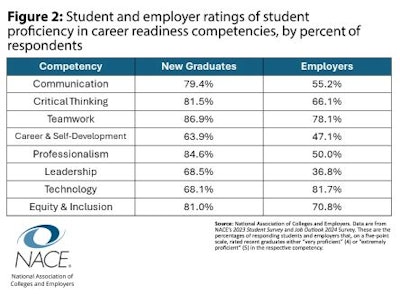The perception between college graduates and potential employers of the new grads’ competencies differs widely, according to research by the National Association of Colleges and Employers (NACE).
 National Association of Colleges and Employers
National Association of Colleges and Employers
“There is a clear disconnect between how students and employers perceive students’ development of these competencies,” said NACE President and CEO Shawn VanDerziel. “For all but one of the competencies, college students believe they are more proficient than do their potential employers.”
While new grads consider themselves most proficient in teamwork, professionalism, and critical thinking, employers rated new grads highest in technology, teamwork, and equity and inclusion, according to NACE’s research, which found wide gaps in perception. For example, 84.6% of students maintained a perception that they were “very or extremely” proficient in professionalism as a competency versus 50% of employers who shared the perception of student professionalism.
“This general disconnect may occur because many students don’t understand the connection between the knowledge and experience they gained in college and the competencies,” explained VanDerziel. “Therefore, students cannot effectively articulate this to employers on their resumes or during interviews.”















